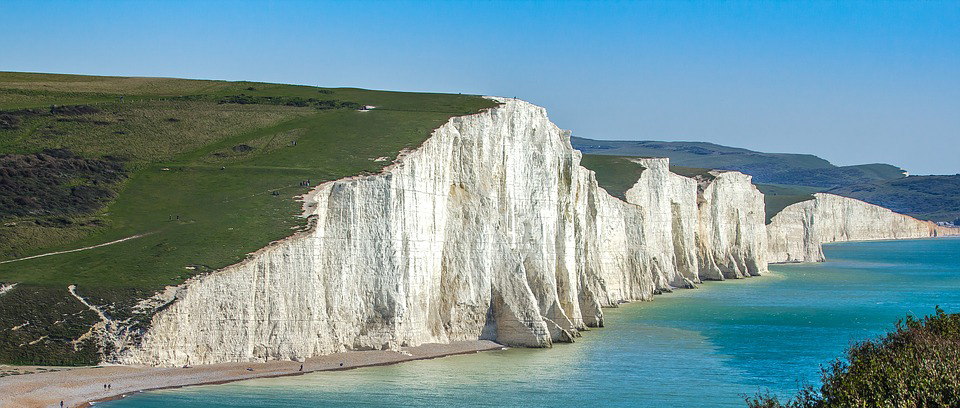Chalk

|
Contents |
[edit] Description
Chalk is a white, fine-grained, often soft crumbly type of limestone, made up of the shells of minute organisms that form into a sedimentary rock. Most chalk rocks were deposited during the Cretaceous period (145.5 million to 65.5 million years ago). It derives its name from the Latin word (creta) for chalk - although most Cretaceous rocks are not chalks.
The purest chalk rocks can be almost totally made up of calcium carbonate in the form of the mineral calcite, others will contain other materials such as quartz and silica as well as clay minerals and calcium phosphate. There are many chalk deposits along the Southern coast of England, which are dramatically exposed as white cliffs such as the white cliffs of Dover and the Seven Sisters in Sussex.
Chalk is porous and therefore can hold water, which can be advantageous for areas that suffer from drought because these rock types can provide a natural reservoir that releases water slowly.
In most cases chalk rocks can be easily accessed and examined as they are close to the surface and have not deformed over time.
[edit] Mining
Ancient chalk mines exist across much of southern England, associated with agriculture, often found next to field boundaries or woodland. Today, with seven of the ten leading global exporters, Europe has many mines, with France and Germany as top exporters. Chalk is generally open cast mined with a few closed cast mines.
[edit] Major uses
Today chalk is classified into natural and human-made chalk. Natural chalk as mined across Europe has been used as a raw material for quicklime, slaked lime and cement, it is also used in agriculture as a means of reducing the acidity of soils. Chalk has applications in power plants to neutralise acid gasses that are generated and as a filler and pigment in paper, plastic and construction materials. The traditional, more direct uses of chalk in construction also continue with in cob construction quicklime, bricks and builder's putty (with flaxseed oil) although this now often replaced with human-made chalk.
In 1965 the Institution of Civil Engineers organised a conference on the use of chalk in earthworks and foundations. In the UK, Chalk is used for a variety of civil engineering purposes including the construction of embankments for railways, trunk roads, motorways, fills, tunnels, cuttings, retaining structures, shallow foundations and pile foundations.
[edit] Minor uses
Other broader uses of natural chalk, now mostly replaced by human-made chalk, include the production of blackboard chalk (traditionally natural chalks now from mineral gypsum or calcium sulfate), and pavement, field and boundary marking chalk powder (now mostly titanium dioxide). In gymnastics, rock climbing, weight lifting and combat traction, magnesium carbonate is now generally used. Chalk used by tailors as well as carpenters was traditionally hard and now often made of magnesium silicate. Finally it is used as a mild abrasive and might be added to toothpaste, to help cleaning and as an additive to metal polish.
[edit] Related articles on Designing Buildings
Featured articles and news
A case study and a warning to would-be developers
Creating four dwellings for people to come home to... after half a century of doing this job, why, oh why, is it so difficult?
Reform of the fire engineering profession
Fire Engineers Advisory Panel: Authoritative Statement, reactions and next steps.
Restoration and renewal of the Palace of Westminster
A complex project of cultural significance from full decant to EMI, opportunities and a potential a way forward.
Apprenticeships and the responsibility we share
Perspectives from the CIOB President as National Apprentice Week comes to a close.
The first line of defence against rain, wind and snow.
Building Safety recap January, 2026
What we missed at the end of last year, and at the start of this...
National Apprenticeship Week 2026, 9-15 Feb
Shining a light on the positive impacts for businesses, their apprentices and the wider economy alike.
Applications and benefits of acoustic flooring
From commercial to retail.
From solid to sprung and ribbed to raised.
Strengthening industry collaboration in Hong Kong
Hong Kong Institute of Construction and The Chartered Institute of Building sign Memorandum of Understanding.
A detailed description from the experts at Cornish Lime.
IHBC planning for growth with corporate plan development
Grow with the Institute by volunteering and CP25 consultation.
Connecting ambition and action for designers and specifiers.
Electrical skills gap deepens as apprenticeship starts fall despite surging demand says ECA.
Built environment bodies deepen joint action on EDI
B.E.Inclusive initiative agree next phase of joint equity, diversity and inclusion (EDI) action plan.
Recognising culture as key to sustainable economic growth
Creative UK Provocation paper: Culture as Growth Infrastructure.
Futurebuild and UK Construction Week London Unite
Creating the UK’s Built Environment Super Event and over 25 other key partnerships.
Welsh and Scottish 2026 elections
Manifestos for the built environment for upcoming same May day elections.
Advancing BIM education with a competency framework
“We don’t need people who can just draw in 3D. We need people who can think in data.”
























